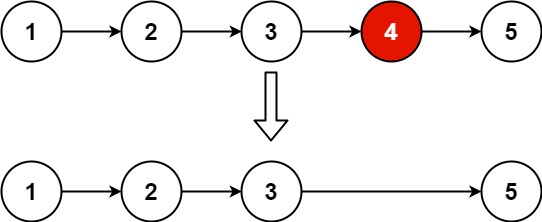Given the head of a linked list, remove the nth node from the end of the list and return its head.
Example 1:
Input: head = [1,2,3,4,5], n = 2 Output: [1,2,3,5]
Example 2:
Input: head = [1], n = 1 Output: []
Example 3:
Input: head = [1,2], n = 1 Output: [1]
- The number of nodes in the list is
sz. 1 <= sz <= 300 <= Node.val <= 1001 <= n <= sz
Follow up: Could you do this in one pass?
# Definition for singly-linked list.
class ListNode:
def __init__(self, val=0, next=None):
self.val = val
self.next = next
class Solution:
def removeNthFromEnd(self, head: Optional[ListNode], n: int) -> Optional[ListNode]:
# Create a dummy node to handle edge cases such as removing the first node
dummy = ListNode(0)
dummy.next = head
# Initialize two pointers
first = dummy
second = dummy
# Move first pointer so that the gap between first and second is n nodes
for _ in range(n + 1):
first = first.next
# Move first to the end, maintaining the gap
while first is not None:
first = first.next
second = second.next
# Skip the nth node
second.next = second.next.next
# Return the head of the modified list
return dummy.nextStrightforward soln O(n) time complexity O(1) space for temp variables.
